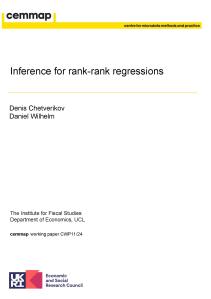We examine the "home bias" of knowledge spillovers (the idea that knowledge spreads more slowly over international boundaries than within them) as measured by the speed of patent citations. We present econometric evidence that the geographical localization of knowledge spillovers has fallen over time, as we would expect from the dramatic fall in communication and travel costs. Our proposed estimator controls for correlated fixed effects and censoring in duration models and we apply it to data on over two million patent citations between 1975 and 1999. Home bias is exaggerated in models that do not control for fixed effects. The fall in home bias over time is weaker for the pharmaceuticals and information/communication technology sectors where agglomeration externalities may remain strong.
Authors

CPP Co-Director, IFS Research Director
Rachel is Research Director and Professor at the University of Manchester. She was made a Dame for services to economic policy and education in 2021.

Research Fellow Columbia University
Sokbae is an IFS Research Fellow and a Professor at Columbia University, with an interest in Econometrics, Applied Microeconomics and Statistics.

John Van Reenen
Journal article details
- Publisher
- Econometric Society
- Issue
- July 2011
Suggested citation
R, Griffith and S, Lee and J, Van Reenen. (2011). 'Is distance dying at last? Falling home bias in fixed effects models of patent citations' (2011)
More from IFS
Understand this issue

It’s time to take a firmer grip on companies and competition law
Globalisation, inequality, feeble productivity growth, earnings stagnation, the falling labour share of national income — the most important features of economic life. And one institution binds them together: the firm.
25 April 2022

Spring Budget 2024: What you need to know
7 March 2024

If you can’t see it, you can’t be it: role models influence female junior doctors’ choice of medical specialty
24 April 2024
Policy analysis

How do the last five years measure up on levelling up?
19 June 2024

Freeports: What are they? What do we know? And what will we know?
10 March 2023

Freeports and Investment Zones – what sorts of things should we consider when assessing whether they are good policy?
10 March 2023
Academic research

Inference for rank-rank regressions
28 May 2024

Understanding Society: minimising selection biases in data collection using mobile apps
2 February 2024

The impact of labour demand shocks when occupational labour supplies are heterogeneous
28 June 2024